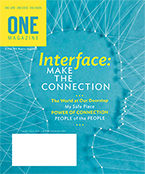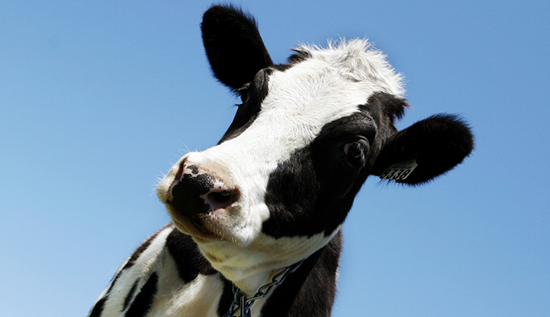
June-July 2015
Interface: Make the Connection
------------------
|






Milk Comes in a Bag
By Mandi Morgan
My husband and I are in the
United States after completing our first term of missionary service in Uruguay. During the first term, we learned a great deal. We spent our first year in Costa Rica learning Spanish, then moved to Uruguay and spent the rest of our term learning more Spanish, Uruguayan culture, new foods, a new climate, a new way of driving, etc.
We saw God work during this first term. We saw Him work in our churches. We saw people saved. But honestly, we saw God work in us more than anything else. We felt Him stretch and mold us through many struggles. I want to share a few of our struggles, coupled with random facts about life in Uruguay, in an effort to raise awareness of missionary life and to provide insight into ways people can pray for missionaries.
Struggle #1 – Everything about life in another country is different.
I expected the language to be different, the culture to be different, the food to taste different, and the people to dress differently. I didn’t expect the differences I found on the mission field to extend all the way down to finding milk in a bag.
Quite literally, milk comes in a bag. When we first made it to Uruguay, we went to the grocery store to look for milk and had trouble finding it. It was strange to find milk in a bag. What do you do with it after you get home? We learned Uruguayans cut the corner of the bag and place it in a small open pitcher.
Sometimes missionaries, especially first-termers, long for something familiar. After being back in the States for a few months, we find ourselves longing for the things of Uruguay. As you reach for your milk jug each morning, pray missionaries will make smooth transitions between their home culture and their host country.
Struggle # 2 – Learning a new language is humbling and hard.
We do not have central heat and air in Uruguay, and Sofia, our youngest daughter, was born in the coldest part of winter. We needed a way to keep her warm, so we purchased a small heater that used a propane tank. My husband went to the local gas station to buy the needed tank. He asked the attendant for a 13-kilo tank…or so he thought. He mistakenly used the word jirafa instead of the word garrafa. The attendant gave him a puzzled look, said the correct word, and then told Neil where to find the tank.

Neil called me a few minutes later to ask me to say the Spanish word for tank. When I told him, he realized he had just asked for a 28-pound giraffe. The slightest difference in pronunciation made a big difference in meaning. Almost all missionaries struggle with language. It is a lifelong process and is often slow and humiliating. When you meet someone whose first language is not English, be patient and remember to pray for missionaries who are learning to communicate as well.
Struggle #3 – We are often uncomfortable.
I grew up on a farm in South Carolina. I believed, for most of my life, shoes were optional. If I had to wear shoes, I kicked them off as soon as the opportunity presented itself. Taking my shoes off was, for me, a way to be comfortable. When we arrived in Costa Rica, I was in for a shock. We learned that Costa Ricans believe you get sick if you walk barefoot. One day, our children were running around our house shoeless when our landlord arrived. He was there to make a repair to our house.
When he noticed our girls’ bare feet, he stopped what he was doing and quickly told me I needed to put shoes on them. He explained that sickness enters the body through the pores of your feet. Since most of the floors are tile, and they stay cold, this adds to the probability you will get sick, according to Costa Ricans. We later discovered Uruguayans believe the same thing. Uruguayans do not kick their shoes off at the door either.
For most of my life, not only did I leave my shoes at the door, I also took my coat off immediately when entering a building or home. This is not done in Uruguay either. Homes are made of cement, have no central heat, and are very cold during the winter. Most Uruguayans wear jackets, along with several layers of clothes, to stay warm in their homes.
One major obstacle we had to overcome was redefining what is comfortable. For us, kicking off shoes and shedding jackets are normal, comfortable things to do, and learning not to do them is a very small example of things missionaries do that are uncomfortable. But when you are stressed, overwhelmed, and homesick, and you live constantly in a state that is uncomfortable, it is difficult.
Yes, we are missionaries, but we are also just people, and the little things sometimes add up to bad attitudes and bitter feelings. The next time you kick your shoes off, shed your coat, or adjust your thermostat, pray we will learn to be comfortable in Uruguay, or learn, as Paul said in Philippians 4:11, “I have learned, in whatsoever state I am, therewith to be content.” Pray also that our attitudes will always be pleasing to the Lord.
Struggle # 4 – Everything takes longer.
Our greatest struggles have been with time. It takes two and a half hours to wash and dry one load of laundry. Top that with the fact that the washing machine only holds a quarter of the clothes as the average-size washer in the States, and you can imagine we spend hours each week just doing laundry. Though this sounds like nothing more than an inconvenience, everything is this way. Everything. Since I have to cook everything from scratch, it takes twice as long to prepare a meal and to wash all the dishes by hand afterward.
It even takes a long time to make an acquaintance. Neil went to the gym nearly four days a week at the same time, each day, for a year. After all that time, he had built enough rapport with only two people to socialize outside of the gym. The ministry is this way as well. It takes a long time to see things accomplished, whether seeing someone saved or planting a new church. Nevertheless, we have a strategy of seeing ten new churches planted over the next ten years. This is a God-sized goal only He can accomplish.
As you wash your clothes or check off the many items on your to-do list, pray we will not get discouraged with how long everything takes. Pray we will not be discouraged by slow results in the ministry, and that God will move in a mighty way in Uruguay. Pray people will know Him, and pray for us as we hope to plant a new church in the city of El Pinar.
As we have ministered in Uruguay, we have struggled with other things as well. But God is faithful, and He has used many of our struggles to draw us closer to Him. As we started our term in Costa Rica to learn Spanish, our house was located beside the language institute we attended. From our back door, we had a beautiful view of the mountains. On many of my hard days, I stood at the back door, looked at the mountains, and quoted Psalm 121:1, “I will lift up mine eyes unto the hills, from whence cometh my help.”
Perhaps you are going through a tough time right now. Struggles are a part of every Christian’s life. It doesn’t matter if we live in Costa Rica, Uruguay, or the United States. If you are struggling with something, be reminded and encouraged that God has promised to be with you. Jesus didn’t calm the sea as Peter began to sink; He simply reached out and took Peter’s hand. Only after they were back in the ship did He command the wind to stop blowing. And it is a good reminder: as long as Peter’s eyes were on Jesus, he didn’t sink beneath the waves of the storm.
I pray each of us will keep our eyes fully on our Savior Jesus, and when we grow afraid, that we will hold tightly to His hand.
About the Writer: Mandi Morgan and her husband Neil began their ministry in Uruguay in 2008.
Learn more at www.fwbgo.com.
|
|

